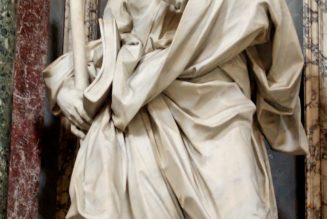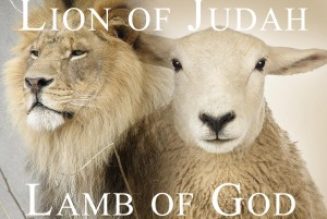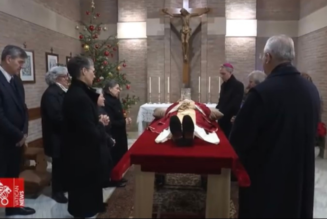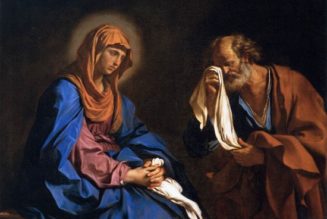On the night before he died, Jesus was thinking about our joy, not his pain — and he shared a secret that we only now may be ready to understand.
The Church has been looking back on that night for weeks now, because what Jesus said in his Farewell Discourse on Holy Thursday reveals the deepest meaning of what he wants us to do now, on the Sixth Sunday of Easter, Year B.
In the Gospel this Sunday Jesus spells out his philosophy of love.
He says, “This is my commandment: Love one another as I love you,” and he repeats it: “This I command you: Love one another.”
By making love a commandment, Jesus reveals a lot about what love is and what it isn’t. It isn’t an emotion that strikes almost at random, like Cupid’s arrow. It isn’t dependent on the feelings we have. Love is an act of the will. It is something we can choose to do or refuse to do, by serving others and by keeping the commandments.
But one thing makes the command to love much easier.
Jesus says: “It was not you who chose me, but I who chose you.” In the Second Reading, St. John says the same thing a different way: “In this is love: not that we have loved him, but that he loved us.”
We have never, will never, and can never earn God’s love, no matter what we do — not even if we become saints, not even if we become martyrs, any more than a plant can make the sun shine or the rains come, even if the plant grows tall. His love came first and is the fundamental thing about us. Our worth and our glory is that we are loved by God. The rest is just his love playing out in our lives.
In fact, “God is love,” which John says in our second reading, is what the Catechism calls God’s “innermost secret.”
God’s very being is love. He is love in his own inner life — love unites the Persons of the Trinity in an “eternal exchange of love.” And the degree to which we love him back is the degree to which we fulfill what he intended all along, because “he has destined us to share in that exchange” of love.
Jesus says, “No one has greater love than this: to lay down one’s life for one’s friends.” The great act of love of Jesus Christ on the cross unites his humanity with the infinite love of his divinity. Jesus in his humanity, dying on the cross, is an icon for what he is in his divine nature: Jesus who loves his Father infinitely and loves us, eternally.
And he invites us to join him there.
As it turns out, entering the love the Son shares with his Father was his mission all along.
Jesus’s entire mission turns out to be about grafting us onto himself and sharing his life in the Spirit so that we can be reunited with our Father, crying with him “Abba! Father!”
We need it, because we turned our back on the Father.
“Man, tempted by the devil, let his trust in his Creator die in his heart,” says the Catechism. “In that sin, man preferred himself to God … he chose himself over and against God.” Before we sinned, says the Catechism, “man was destined to be fully ‘divinized’ by God in glory.” Instead, though, we “wanted to ‘be like God’ but ‘without God, before God, and not in accordance with God.’”
Parents know what it is like when child wreck all the plans we have for them: When they refuse to work hard and leave their potential unfulfilled, when they devote themselves to harmful pastimes, and when they trust themselves to people who will lead them astray. If we could, we would go back in time and give them a “do-over,” trying to make the right path more appealing this time.
Well, the Father is a parent like that, and he can actually do what we can only wish. So when we chose to follow the devil’s lies instead of God’s plan to divinize us, he came back to give us a “do-over.”
On the night before he died, Jesus informs us that “He who has seen me has seen the Father.” If we had a hard time loving an invisible God, he took care of that for us. Then, on the way to his death, he pleaded with us to love his Father.
He knows that we want to be friends, not servants, so he says “I no longer call you slaves, because a slave does not know what his master is doing. I have called you friends.”
The devil pretends to be our friend, tricking us into cheap joy that delivers only suffering anddeath. Jesus is our real friend, asking us to trust him despite the suffering we face, and gives us real joy if we do.
He provides us the sacraments to unite with him, dies with his arms wide open to invite us to love him, then rises from the dead to show he really means it: With him we can live forever. Then he forgives our sins to restore us to Adam and Eve’s innocence, restarting the process of divinizing us as he originally intended.
But what does “divinizing” even mean? Ask Peter.
The First Reading for Sunday is a great lesson in what divinization isn’t — and what it is. It isn’t the way Cornelius treats Peter at the beginning of the reading — or even the way the Holy Spirit treats them all after that. It’s the way Peter treats Cornelius at the end of the reading.
Cornelius is so impressed with Peter he falls at his feet in homage, but Peter stops him. “Get up. I myself am also a human being.” There is no “divinization” of human beings like that — not even apostles.
Next, something extraordinary happens as Peter speaks to Cornelius and his Gentile friends and family about Jesus’s mission. This is a shorter version of the same reading we heard on Easter Sunday, when Peter spelled out the facts of Jesus’s death and Resurrection for the Gentiles. While he is speaking, “The Holy Spirit fell upon all those who were listening,” and they were “speaking in tongues and glorifying God.” That’s impressive, but that still isn’t what “divinization” is.
Next, Peter baptizes the entire household in the name of Jesus Christ. And that is what divinization means.
By being baptized into Christ’s death, we become part of his resurrected life.
The Church has been trying to tell us all Easter that we are being “divinized.”
- On Easter Sunday, we heard from St. Paul, “When Christ your life appears, then you too will appear with him in glory.”
- We will be “victors over the world” we heard from St. John on Easter Sunday II.
- We are “perfected” and “walk in him,” St. John said on the Third Sunday of Easter.
- One day “we shall be like him” John said on the Fourth Sunday of Easter.
- And we “remain in him” and “he remains in us,” John said on the Fifth Sunday of Easter.
That brings us to this Sunday, when John says Jesus invites us into the very life of the Trinity, through love — real love, chosen love, love that endures suffering and setback.
We are “begotten by love,” says St. John. “God sent his only Son into the world so that we might have life through him.”
This is John repeating the Philosophy of Love that Jesus taught him in the Gospel for Sunday, saying “I have told you this so that my joy may be in you and your joy may be complete.”
Joy is his last word on his terrible last night alive, a day that meant pain and betrayal, being dragged away from his friends in the middle of the night, stripped naked and disgraced in public.
Jesus did it all for love, so that we would have the joy he has in the Father. He did it to give us what Adam and Eve lost. And what could be more joyful than that?
Image: Rawpixel








